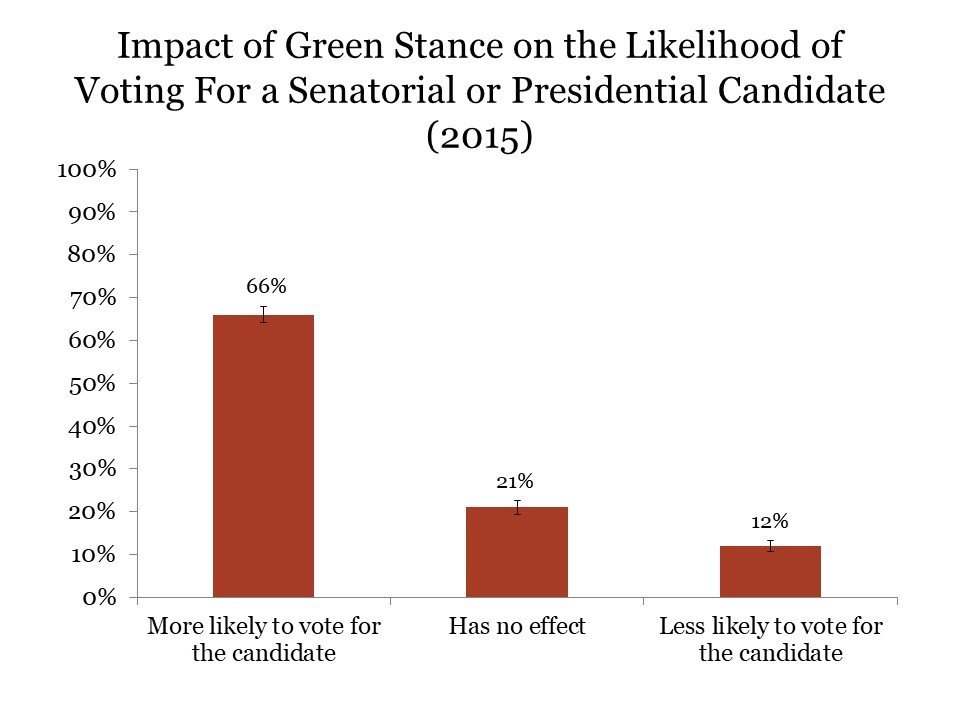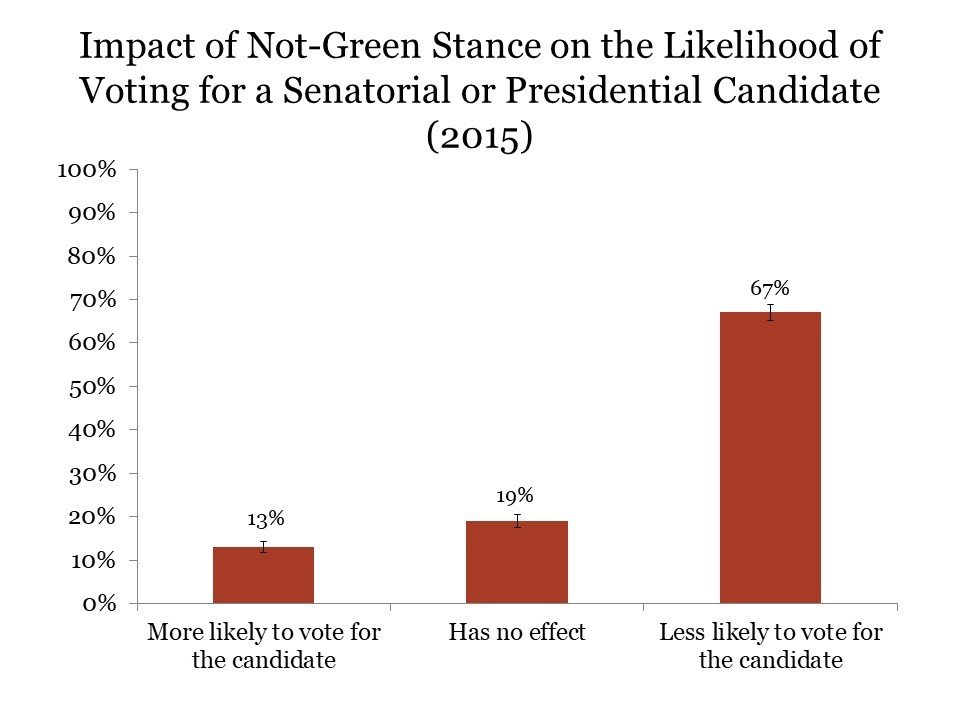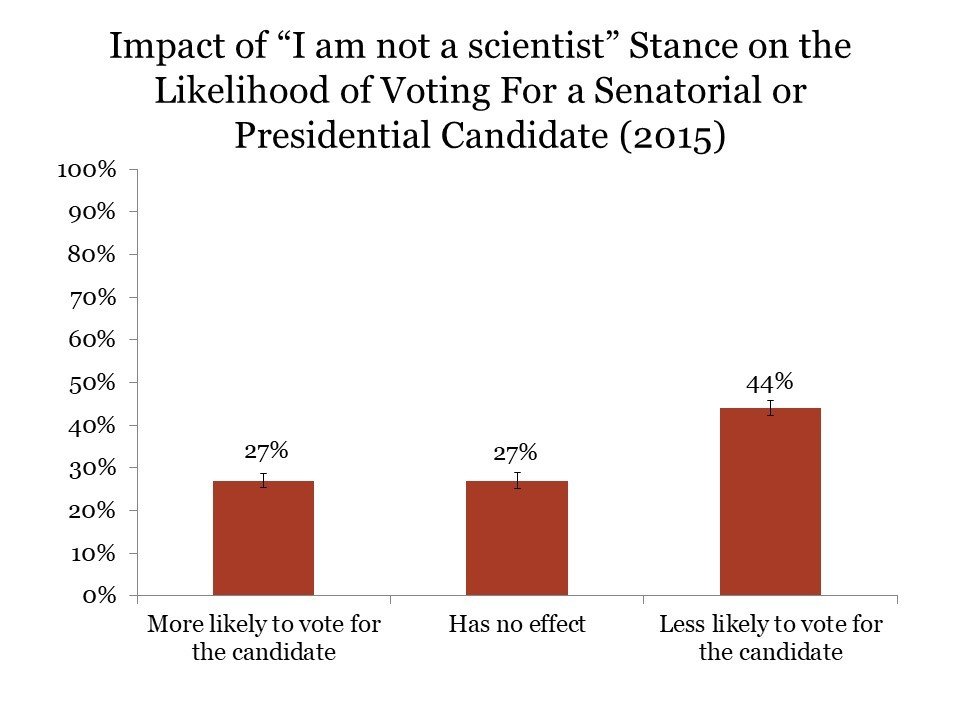Voting Behavior Study 5 – Global Warming and 2015 Hypothetical Candidates
Research by the Political Psychology Research Group at Stanford University
Introduction Fundamentals Who Should Take Action Government Policy Economic Side Effects Willingness to Pay Priority Consequences of Global Warming Preparing for Possible Consequences Consumer Choices Attitude Strength Voter Behavior Opinions in the States Trust in Scientists Scientists' Beliefs Partisan Views Publications
By 2015, Americans heard a number of repeated claims relating to global warming– statements that expressed opposing sentiments.
“I am not a scientist,” had become a routine reply for some Republican leaders. Some of those claimed they were ill-equipped to make claims about the subject, and the phrase also was used by those who called into question the existence and causes of global warming. President Obama was among many who contended that climate change is occurring and should be addressed. Others claimed that it is a hoax and should not be addressed. (1)
The Public’s Take
To learn about people’s reactions to these varying claims, and in particular whether they were likely to vote for candidates making such pronouncements, a January 2015 survey explored these questions by proposing a hypothetical electoral match-up.
In those hypothetical contests, people favored candidates who viewed global warming as a real concern. They were more likely to vote for a Senatorial or presidential candidate who believed it was occurring and supported policies to address it. People were less likely to vote for a candidate who denied the science of global warming.They took a comparatively dim view of a candidate who claimed he or she was not a scientist.
Survey details
A nationally representative sampling of adults heard the interviewers reading statements from three hypothetical candidates running for the U.S. Senate or for president. Each hypothetical candidate expressed a distinct view on global warming:
- That global warming is occurring and should be addressed (‘green’ statement).
“I believe that global warming has been happening for the past 100 years, mainly because we have been burning fossil fuels and putting out greenhouse gasses. Now is the time for us to be using new forms of energy that are made in America and will be renewable forever. We can manufacture better cars that use less gasoline and build better appliances that use less electricity. We need to transform the outdated ways of generating energy into new ones that create jobs and entire industries, and stop the damage we’ve been doing to the environment.”
- That global warming is a hoax and should not be addressed (‘not-green’ statement).
“The science on global warming is a hoax and is an attempt to perpetrate a fraud on the American people. I don’t buy into the whole man-caused global warming mantra. We must spend no effort to deal with something that is not a problem at all. We should not invest in windmills and solar panels as alternative energy sources. Instead we should continue to focus on our traditional sources of energy: coal, oil, and natural gas. We should expand energy production in our country, including continuing to mine our coal and doing more drilling for oil here at home.”
- That the candidate is not a scientist and thus is ill-equipped to make claims about global warming.
“When people ask me if I believe global warming has been happening, I’m not qualified to debate the science over climate change, because I am not a scientist. When people ask me if I believe human activity causes global warming, I don’t know. There is significant scientific dispute about that. We can debate this forever. I am not qualified to make this decision. But I am astute enough to understand that every proposal to deal with climate change involves hurting our economy and killing American jobs.”
The order in which respondents heard these statements was randomized. Respondents were asked, “If a candidate says this, would this make you more likely to vote for this candidate, less likely to vote for this candidate, or would it not affect how likely you would be to vote for this candidate?”
Results
Overall, a majority of people were more likely to vote for the candidate making a green statement (66%) and less likely to vote for the one with the non-green position (67%), and a large minority (44%) were less likely to vote for the one with a non-committal stance (see the figures below). These findings are especially strong for those who believed global warming has been happening, who attached high personal importance to the issue, and who were Democrats and Independents.



Democrats, Independents and Republicans:
More likely to vote for the green candidate:
81% of Democrats
64% Independents
48% of Republicans
Less likely to vote for not-green candidate:
78% of Democrats
69% Independents
48% of Republicans
Less likely to vote for ‘I am not a scientist’ candidate
58%, of Democratic
43%, of Independents
27%, of Republicans
Study details:
SSRS interviewed a representative national sample of 1,006 U.S. adults by telephone. Of those, 483 respondents were interviewed on a landline and 523 on a cell phone. Interviews were conducted between Jan. 7 and 22, 2015, and were conducted in English and Spanish. The AAPOR Response Rate 3 was 12%.